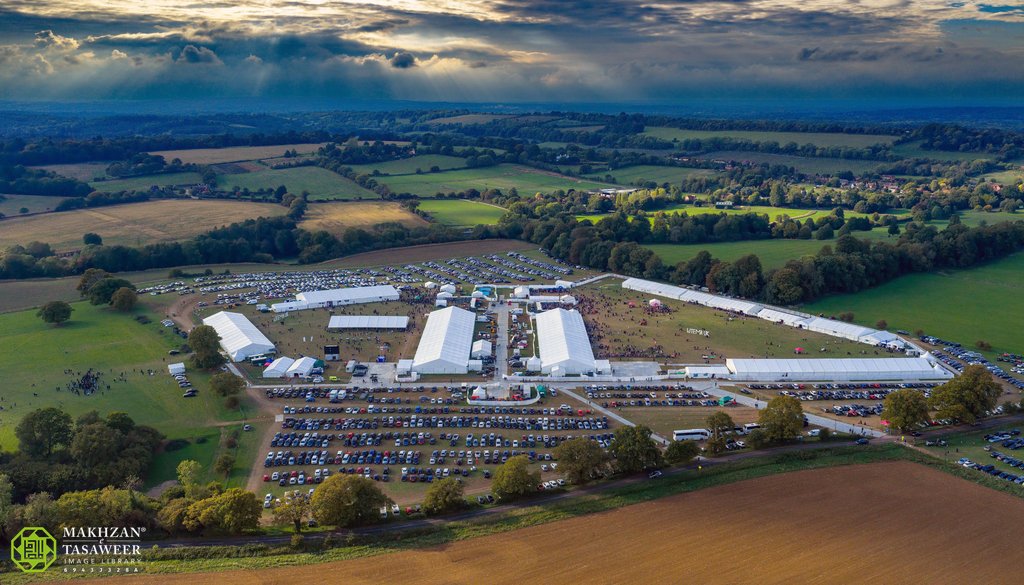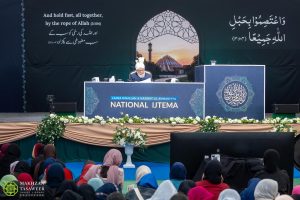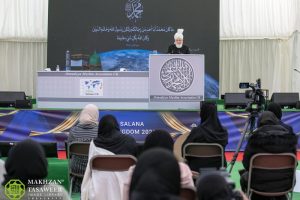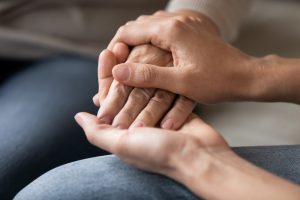
Komal Hadi, UK
Recently in Puttenham, Surrey, over 8000 women and girls from around the UK assembled at a unique event. This was no ordinary gathering, and these were no ordinary women.
Equipped with pens, notebooks, and a desire to expand their horizons, Ahmadi Muslim women – part of the Ahmadiyya Women’s Auxiliary Organisation – were ready for their annual gathering, known as an Ijtema, an Arabic word which means a ‘congregation’ or ‘conference’.
The agenda was abundant with educational and sports competitions; presentations and lectures on an array of religious and secular topics, including science exhibitions and even medical insights from professionals.
A glance around the venue showed a mosaic of women of all different ages and backgrounds channelling their competitive spirits for the various competitions. A mother took the stage for the speech competition, ready to deliver the words she’d spent hours researching and preparing. A teenage high school student sang melodiously in the poem recitation competition comprising poems written by the Founder of the Ahmadiyya Muslim Community (as) and his Caliphs. Girls as young as seven years old could be seen with their mothers, revising verses for the Holy Qur’an memorisation competition.
Everyone put their best foot forward not only in vying for the top positions in these competitions, but also to foster and build a bond of sisterhood with women and girls from across the country. This is nothing new for Ahmadi women, as they’ve been raised amongst constant academic celebration. For them, these competitions, public speaking, and creative pursuits are second nature. These gatherings and retreats are, in fact, an opportunity for women to showcase their refined academic skills; something they’ve been inspired to do through their faith. Here, tired allegations about Muslim women and whether they are ‘allowed’ to study, come to perish.

Other aspects of the three days comprised a series of lectures and presentations across different marquees on the site by experts in their respective fields. ‘Knowledge without empathy is void of any use’ were poignant words expressed by Iffat Mirza, a PhD student and president of the Ahmadiyya Muslim Women Students’ Association (AMWSA) – a modern-day female-led organisation – as she emphasised the value of applying one’s skills for the advancement and betterment of society.
Her presentation addressed how the Caliphate of the Ahmadiyya Muslim Community encourages education and inspires the youth to achieve its heights, and then motivates them to share their knowledge with the world. Countless Ahmadi Muslim women attribute their academic success directly to the Caliph of the Community, Hazrat Mirza Masroor Ahmad (aba), a beacon of wisdom who advocates the need for high educational achievement within the community. It was in this spirit that another presentation on ‘studying away from home’ helped equip women to prepare for the challenges of venturing into the wide world independently.

In another marquee different but equally powerful words inspired more women, ‘if you want to see an example of true love,’ said Reem Shraiky, an Arabic translator and researcher for the Ahmadiyya Muslim Community, ‘look no further than the example of the Holy Prophet (sa) and his wife Hazrat Khadijah (ra).’ The talk highlighted the life of Hazrat Khadijah (ra) as a role model; she was a businesswoman who demonstrated to future generations the power and freedom Muslim women have. At the same time, she was also an exemplary wife and mother. Providing evidence of her multifaceted nature, which was kind, resilient, strong and wise, this lecture left its listeners with a renewed sense of pride to be a woman so protected and elevated by the Islamic faith.
This was an event not just for the elevation of the mind but also of the body. Professor Amtul Razzaq Carmichael – a consultant oncoplastic surgeon – ran a breast-screening clinic at the Ijtema site, giving women the opportunity to drop in and have their questions answered and learn how to check for abnormalities relating to breast cancer. She told us, ‘As Ahmadiyya Muslim Women’s Association is an organisation which has been founded to increase women in their education and training, we felt this was a great opportunity to increase and enhance the knowledge level of women during the Ijtema.’ The uptake of this clinic was ‘exceptionally high’ despite the ‘logistical challenges when you are trying to run a breast clinic in a field.’ The impact of this voluntary service over the last three years has been lifesaving; three women were diagnosed with breast cancer through this initiative – women, who Professor Carmichael believed may not have been diagnosed had they not visited this Ijtema clinic. In a true full circle moment, the work of Professor Carmichael and her team is the embodiment of the words we heard earlier, ‘knowledge without empathy is void of any use.’
Aside from being a place of learning, the Ijtema is also a place for women who are entrepreneurs to polish their skills and advertise their self-made businesses. At the Bazaar, customers bought handmade goods, clothes and art by women who built their companies from the ground up, starting at home while raising children, and then spreading their wings further into the online space and markets; and as many shared with us, they did so with complete independence and empowerment.

The highlight of the event was the address delivered by the Fifth Caliph and Worldwide Head of the Ahmadiyya Muslim Community, His Holiness, Hazrat Mirza Masroor Ahmad (aba). A leader in all facets, His Holiness (aba) has always been a champion for women’s rights, not only dispelling misconceptions about women in Islam through his various speeches and addresses, but also empowering Ahmadi Muslim women to confidently play their roles in society and to show the world the beautiful and empowering nature of their faith. His Holiness (aba) has often said that women shape the future of society, and pursuing higher education to serve humanity is the hallmark of a Muslim woman. In this year’s address, His Holiness (aba) said,
‘Remember that Lajna Ima’illah [Ahmadiyya Muslim Women’s Auxiliary Organisation] was founded for the moral and spiritual uplift of Ahmadi women and girls, so they may recognise that they have a true identity and value within our Jama’at [Community]. To preserve the honour and dignity of Lajna and the Jama’at, you must embrace this identity and seek to enhance its beauty and distinction.’
Thus, every aspect of the Ijtema demonstrated to onlookers that Muslim women have all-encompassing skills that enable them to enjoy the fruits of their studies, all while simultaneously serving God or choosing to lead domestic lives. These two lifestyles are not mutually exclusive, just as millions of successful women around the world have proven time and again. As a result, we see female Muslim doctors working in hospitals, female Muslim professors teaching at schools and universities, female Muslim writers who have penned numerous books, and just about any other profession you can think of.
The empowerment of Muslim women, which the Ahmadiyya Muslim Community champions, is a direct manifestation of the true Islamic teachings as taught by the Holy Prophet Muhammad (sa). Contrary to some assumptions which may be peddled by a skewed understanding of Islam, work, study, and growth are not simply an allowance granted to women in Islam but a fundamental and protected right preserved in its sacred teachings.
About the Author: Komal Hadi serves on The Review of Religions Online Team




Add Comment